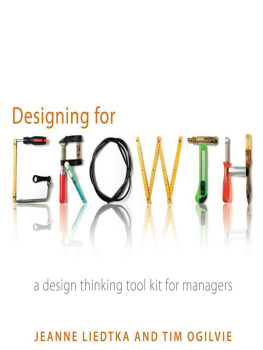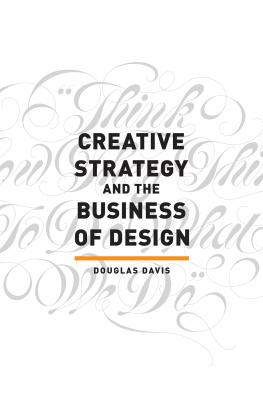
Designing for Growth
Designing for Growth:
a design thinking tool kit for managers
By Jeanne Liedtka and Tim Ogilvie


Columbia University Press
Publishers Since 1893
New York Chichester, West Sussex
cup.columbia.edu
Copyright 2011 Columbia University Press
All rights reserved
E-ISBN 978-0-231-52796-5
Library of Congress Cataloging-in-Publication Data
Liedtka, Jeanne.
Designing for growth : a design thinking tool kit for managers / by Jeanne Liedtka and Tim Ogilvie.
p. cm.
Includes bibliographical references.
ISBN 978-0-231-15838-1 (cloth : alk. paper) ISBN 978-0-231-52796-5 (ebook)
1.Creative ability in business. 2. Organizational change. 3. Success in business. I. Ogilvie, Tim. II. Title.
HD53.L543 2011
658.4063dc22
2010053277
A Columbia University Press E-book.
CUP would be pleased to hear about your reading experience with this e-book at .
References to Internet Web sites (URLs) were accurate at the time of writing. Neither the authors nor Columbia University Press is responsible for URLs that may have expired or changed since the manuscript was prepared.
To Salz and Caroline
CONTENTS
We both owe much to the Darden School of Business at the University of Virginia and the Batten Institute and their leadership. They brought us together and supported us every step of the way. We are especially grateful to Dean Robert Bruner and Batten Institute Managing Director Elizabeth O'Halloran, each of whom helped Jeanne find the time and then Jeanne and Tim the resources to accomplish this project. And to David Newkirk, who continued to tell us that our efforts would matter to managers.
And then there is our trusted editor, Amy Halliday. Amy has the gift of knowing when to push and when to pull. We are grateful for her unfailing candor, patience, and generous advice. She was a relentless advocate for the practicing manager. If this book does not appeal to the sensibilities of managers, it is not for lack of effort by her.
The other crucial member of our team comes from Tim's good deeds. Eight years ago, he cofounded an innovation strategy consulting firm, and Jenny Lynn Cargiuolo joined that firm. Her first job; Peer Insight's first designer. Today we think of her as a design Yoda, and every key design concept in this book was vetted by her. Admittedly, several over-simplifications in the book exist over her staunch objections (or what Jenny charmingly refers to as her dead body).
Myles Thompson and Bridget Flannery-McCoy at Columbia University Press shepherded us through the publication process with effortless wisdom and constant cheereven when Tim managed to lose the signed contracts in the mail. (Sorry, Bridget. But it all worked out, didn't it?) The gorgeous layout of the book is the work of visual genius Daniel Lombardi. The early drafts were shaped by Preethi Lakshminarayanan.
From Jeanne
I want to begin by thanking Tim, my coauthor. I look at the finished product that our partnership has wrought, compare it to my text-laden, unimaginatively illustrated previous writing efforts, and thank my lucky stars for the coincidence that brought Tim to the Darden School. To think, as I did when I initially began this project, that I could do justice to the world of design thinking without a partner who lived and breathed design was utterly foolhardy. But Tim brought so much more to this effort than his extraordinary talent for visualizationhe brought stories, tools, unfailing good humor, intelligence, and persistence. Most important, he brought such an innate talent for demonstrating design thinking every step of the way that it was impossible to lose sight of our topicand why it so enriches traditional business thinking. This book is a living embodiment, for me, of what happens when design and business come together.
I also want to thank my Darden colleagues and friends, who have made the school a very special home for me for two decades now, creating a place I find it unimaginable not to be part of. It seems to me that almost everything I know that feels important was learned from one of you. And my fascination with exploring where humanity and business intersect can surely be traced to four culprits: Ed Freeman, Alec Horniman, and Jack and Carol Weber. This fearsome foursome are my Yodas.
Karen Musselman makes my life at Darden wonderful by bringing the force of her wisdom and orderliness to tame my chaos. Andrew King never fails to answer my distress call. Ed Hess has been a source of inspiration and encouragement, and I consider luring him to Darden my greatest gift to the school. Lynn Isabella and Susan Chaplinsky have made becoming an MFL actually fun. And, finally, thanks to all the Darden students who struggled to learn this stuff along with me and taught me as much as I taught them.
Then there is the wonderful group of thought leaders who took me by the hand and patiently educated this most traditional of strategists about design: Roger Martin (for leading the way), Angela Meyer (for never once suggesting that I was in way over my head), and Nathan Shedroff, Heather Fraser, and Maureen Thurston (for taking me from crayons to perfume).
On a personal note, I have my large and wonderful family (who keep me humble) and old and dear friends (who keep me sane) to thank. To my sister Jane, especially, who has been the most constant source of support and encouragement in my life for the past thirty-odd years (Rehoboth aside).
Finally, to Salz, the most courageous and creative thinker I've ever met. Thank you, Taco Bell!
From Tim
Writing a book is a preposterous idea to a busy consultant who moonlights as a husband, father, and neglectful friend. I can't contemplate making any acknowledgements without first acknowledging my coauthor, Jeanne Liedtka. If you know Jeanne, then you know the term force of nature is not hyperbole. Her incendiary intellect is perfectly balanced by an utter lack of pretension and a relentless energy to get it done. The approachable authorial voice of the book is Jeanne's. I just learned to mimic it. And the generous spirit of encouragement? That's all hershe just puts it out there, as naturally as breathing.
It occurs to me that writing a book and working seem incompatible. Someone had to mind the store. My business partner Gordon Hui did more than that. When Jeanne invited me to the project, I hesitated. Gordon insisted that I accept. A few months into the project, my father fell ill. I decided to drop out; it was only fair to Jeanne and Amy. Absolutely not, he advised. My father recovered, and so did the book.
Jeneanne Rae, my other business partner and cofounder of our firm, did not bear the same burden of prodding me. She just had to keep the business afloat. During a global recession. Nearly a decade ago, Jeneanne uttered, in a Graduate -style aside, her advice for my future: service innovation. Little did she know I would embrace her adviceand herso wholeheartedly.
Many other members of our firm chipped in, mostly by teaching me lessons on their projects but also by providing a key story, reading early chapters, and digging up obscure facts and sources. These contributors include Katie Waterson, Kimberly Campbell, Carl Fudge, Pat Dewey, Jamie Mash, Colin Hudson, and Kristin Metropolous.
How did I learn what I wrote about? It was on the backs of a short list of courageous clients over the past eight years who shared their hopes and challenges and invited me to partner with them. In less than a decade, I went from wide-eyed adventurer to aspiring sage. The clients that have aided in this conversion include Mark Hadding at Siemens, Diane Ty and Rick Bowers at AARP, Jacqueline LeSage Krause and Dave Peak at The Hartford, Iain Campbell and Bob Russell at York, Claudia Kotchka and Cindy Tripp at P&G, Dave Jarrett and Steve Josey at Crowe Horwath, Dale McIntyre at Behr, Melody Roberts and Denis Weil at McDonald's, Lem Lasher at CSC, Sam Lucente, Debbie Mrazek, and Glenna Patton at Hewlett-Packard, Lauri Kien Kotcher at Godiva (formerly at Pfizer), Peter Westerstrahle and Tiina Tanninen-Ahonen at Tekes, Scott Williams at Starwood Hotels, Austin Henderson at Pitney Bowes, Kirby McDaniel at Hallmark, and Andy Winslow at Celestica. These are people of uncommon courage and generosity. I am deeply in their debt.
Next page













